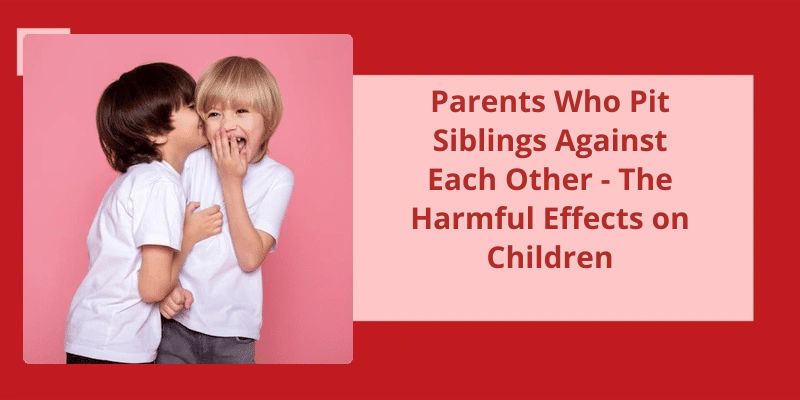The dynamics between siblings are often complicated and can be influenced by a variety of factors, including the behavior of parents. Unfortunately, some parents may unconsciously or intentionally pit their children against each other in order to fulfill their own emotional and psychological needs. Narcissistic parents, in particular, may manipulate their children into adopting certain roles and playing out conflicts that only serve to reinforce the parent's distorted self-image. This pattern of sibling rivalry can be harmful both in the short-term, creating tension and resentment between siblings, and in the long-term, impacting family relationships and personal development. Recognizing the signs and effects of parental manipulation can be the first step in breaking this destructive cycle and fostering healthier family dynamics.
Why Parents Pit Siblings Against Each Other?
The underlying reason for this behavior is often rooted in the narcissistic parents need for validation and control. By setting up a competitive environment, they can maintain their sense of superiority and ensure that their children are focused on pleasing them rather than seeking their own individual paths.
In many cases, this dynamic can be particularly damaging to children who’re less able to compete or who struggle with anxiety or self-esteem issues. These children may feel neglected or left behind by the attention lavished on their siblings, leading to feelings of worthlessness or failure that can continue into adulthood.
Unfortunately, this type of behavior often goes unnoticed or even celebrated by society, which tends to view competition as a positive force in shaping character and success. This can make it difficult for children and families to recognize and address the destructive effects of this type of parenting.
The best way for siblings to overcome this type of competition is to work together to create an environment that supports each others passions and goals.
Ultimately, the responsibility for creating a healthy and supportive environment falls on the parents themselves. By recognizing the negative impact of their actions and working to change their parenting behaviors, they can create a more positive environment for their children to grow and flourish in. This can involve seeking out therapy or other professional support, as well as actively working to foster positive relationships and open communication within the family.
It’s important to understand the tactics that narcissistic mothers use to create sibling rivalry, as it can have lifelong effects on the relationships between siblings. By establishing a favourite, scapegoat, and lost child, a narcissistic mother cultivates an environment where competition and jealousy thrive, leading to toxic dynamics between siblings.
How Do Narcissistic Mothers Create Sibling Rivalry?
And the lost child is often ignored or forgotten. This creates an enormous amount of tension and competition between siblings. The golden child is often showered with praise and adoration while the scapegoat is criticized and blamed for everything that goes wrong. The lost child is left feeling invisible and neglected.
Narcissistic mothers use these tactics to maintain their control and power over their children. They pit their children against each other, knowing that it will keep them occupied and distracted from their own needs and desires. This way, they’re able to manipulate and exploit their children without anyone questioning their behaviour.
In addition to this, narcissistic mothers create a toxic environment by constantly comparing and contrasting their children. They make hurtful comments about their appearances, abilities, talents, and personalities. These comments are designed to create insecurities and rivalries among siblings.
In some cases, narcissistic mothers may even go as far as fabricating stories and lies about their children. They’ll manipulate situations and events to make one child look good and another look bad. They’ll spread rumours and gossip to create division and tension within the family.
She does this by creating a toxic environment where siblings are pitted against each other. This environment breeds jealousy, resentment and anger, and creates long-lasting scars that can impact siblings well into adulthood. It’s important for siblings to recognize these behaviours and work together to confront and overcome them.
How Do Narcissistic Mothers Affect Their Children’s Self-Esteem and Confidence?
Narcissistic mothers can negatively impact their children’s self-esteem and confidence.
Narcissistic triangulation between siblings is a common issue that arises in some families where one parent attempts to pit siblings against each other. This manipulation tactic can have devastating effects on the relationship dynamics among siblings, and often leads to feelings of anger, jealousy, resentment, and confusion. The parent’s behavior can take many forms, but one common example is the favorite child versus the scapegoat dynamic.
What Is Narcissistic Triangulation Between Siblings?
Narcissistic triangulation between siblings is a form of emotional manipulation that occurs when a narcissistic parent involves one child in their conflicts with another child. The parent typically sets up a dynamic where one child is favored and another is scapegoated, thereby pitting the children against each other. The favored child is often used as a tool by the narcissistic parent to control and exploit the scapegoated child.
The effects of narcissistic triangulation can be traumatic and lasting. The scapegoated child can experience feelings of shame, inadequacy, and rejection, and may develop mental health issues such as depression, anxiety, and low self-esteem. Meanwhile, the favored child may become narcissistic themselves, developing a sense of entitlement or superiority over other family members.
The parent may also criticize one child in front of the other, creating a sense of competition and jealousy between siblings. Additionally, the parent may manipulate one child into spying on the other, or use one child to deliver messages to the other as a way of controlling the family dynamic.
Unfortunately, narcissistic triangulation between siblings can be difficult to identify and address. The narcissistic parent may be skilled at deflecting blame and convincing their children that their behavior is justified. Additionally, the affected siblings may have difficulty recognizing the abuse due to the systemic nature of the dynamics, further complicating the resolution of the issue.
It’s important for individuals to educate themselves on the topic and seek professional help if necessary for both the scapegoated and favored child. By working through these painful dynamics, individuals can begin to heal and build healthier relationships with themselves and others.
How to Identify if You Have Experienced Narcissistic Triangulation Between Siblings
Narcissistic triangulation between siblings occurs when a parent or sibling uses another sibling as a weapon to manipulate or control you. Signs that you may have experienced this include feeling ignored or excluded, being constantly compared to siblings, or being forced to choose sides in conflicts.
Source: Narcissistic Triangulation: Definition, Examples, & How to …
Narcissism is a personality trait that can have devastating effects on personal relationships. When it comes to siblings, it can cause jealousy, rivalry, and ultimately estrangement. The non-narcissistic sibling may find it hard to spend time with their narcissistic counterpart, leading to relationship strain. In this article, we will explore how narcissism can lead to sibling estrangement and what steps can be taken to repair the relationship.
How Narcissism Can Lead to Sibling Estrangement?
Narcissism is a personality disorder in which people possess an inflated sense of self-importance, a need for excessive admiration, and a lack of empathy towards others. While narcissistic traits can manifest in varying degrees, in more extreme cases, they can lead to familial estrangement. Narcissistic siblings can create an environment of toxic competition with non-narcissistic siblings, leading to feelings of inadequacy and a fractured relationship.
When a narcissistic sibling enters a room, they tend to demand attention and assume that the focus should be entirely on them. This behavior further creates a sense of competition between siblings, which causes resentment and jealousy, leading to estrangement.
Furthermore, narcissistic siblings avoid responsibility for their actions, blaming others for anything that goes wrong in their life. They rarely apologize even when they’ve caused harm or hurt someone close to them. These traits display a lack of accountability and indicate an inability to empathize with those around them. Non-narcissistic siblings may choose to distance themselves from the person as their lack of remorse can also be a reason for the broken relationship.
They may use their charm to make the other sibling feel like they’re the only one who can help them, even if they’re taking advantage of them. When the non-narcissistic sibling becomes aware of the manipulation, they may choose to step back from the relationship altogether.
They may feel they aren’t good enough or that they don’t matter. Eventually, they may become fed up with the competition mentality and choose to limit their contact, leading to a broken relationship.
Their lack of accountability, poor communication, manipulative tactics, and demanding nature can make it hard for a relationship to flourish, eventually causing estrangement.
Dealing with a narcissistic family member, especially a sibling, can be incredibly challenging and emotionally draining. Setting boundaries and communicating them is essential, but it’s not always enough. In order to maintain your own well-being, you may need to reduce contact over time and learn to say “no” when necessary. It’s also important to build a support system and practice regular self-compassion to protect yourself from the negative effects of their behavior.
How Do You Ignore a Narcissistic Sibling?
Dealing with a narcissistic sibling can be a challenging and emotionally exhausting experience. Narcissists tend to have a grandiose sense of self-importance and lack empathy, making it challenging to have a healthy relationship with them. It can feel like you’re walking on eggshells around them, and their behavior can leave you feeling demoralized and stressed.
Knowing your boundaries is the first step in dealing with a narcissistic family member. It’s crucial to have a clear understanding of what you’re willing to tolerate and what you’re not. Take some time to reflect on what behaviors are unacceptable to you, and communicate those boundaries with your sibling. Boundaries are a necessary distance, and it may require that you set them in order to maintain emotional health.
Once you’ve established your boundaries, it’s essential to stay firm and enforce them. Narcissists can be manipulative, and they may try to push your limits. However, it’s essential to remain steadfast in your position and resist their attempts at emotional manipulation. Remember, standing firm will empower you in the long run, and it will discourage their inappropriate behaviors in the future.
Narcissists will deflect and project their insecurities onto others, making it near impossible to resolve the issue. Instead of confronting them head-on, you may choose to ignore them and avoid contact or leave the room when they enter. It may not be easy, but it can be an effective way to protect your mental well-being.
Rejecting self-limiting beliefs is an essential step in dealing with a narcissistic family member. When you’re around someone as self-centered as a narcissist, it’s easy to question yourself, your abilities, and your worth. However, it’s crucial to remind yourself that their behavior isn’t a reflection of you. They’ve their issues that they need to work through, and you aren’t responsible for fixing them.
Conclusion
It’s imperative to recognize the damaging effects of parental favoritism and constant comparison between siblings. The negative impact on self-esteem, self-worth, and family dynamics can lead to long-lasting emotional scars. It's crucial that parents choose to nurture the unique qualities of each child and encourage their individual growth. Siblings who’ve been pitted against each other must actively work towards rebuilding their relationship and unlearning the toxic patterns they’ve internalized. It's only then that families can heal and move towards happier and healthier relationships.






